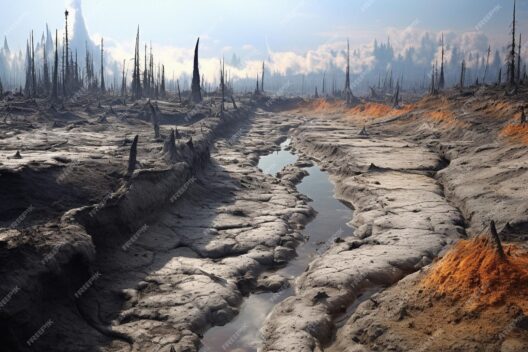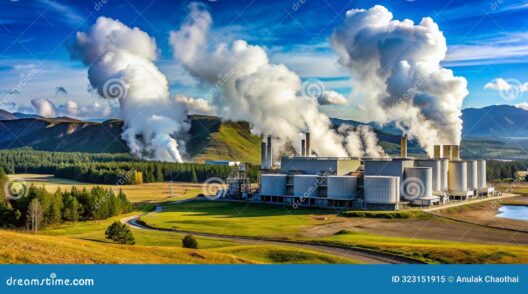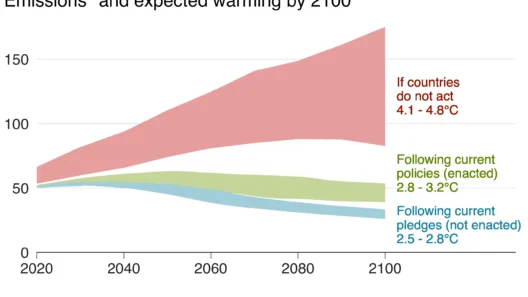A land of disbelievers, where the fabric of reality is woven not with the threads of empirical evidence, but with strands of skepticism and misinformation. This juxtaposition of fact and fiction presents a chilling tableau of the contemporary climate debate, where tangible crises confront a populace engulfed in denial. To navigate this quagmire, it is imperative to unravel the intricate tapestry of beliefs that underpins the reluctance to acknowledge scientific consensus on climate change.
At the heart of this discourse lies a profound metaphor: the “climate chasm.” This metaphorical abyss separates the undeniable reality of anthropogenic climate change from the myriad individuals who, often for ideological or economic reasons, choose to stand on its precipice, peering into the depths of empirical evidence yet unwilling to plunge into acceptance. Just as a tightrope walker balances precariously above the canyon floor, so too do these disbelievers navigate their precarious position, fearfully oscillating between denial and the potential panic that acceptance may evoke.
The origins of this phenomenon are as complex as the climatic alterations themselves. Several constituents converge to form the basis of climate denialism. A significant factor is the persistence of misinformation perpetuated through various channels, including social media, political rhetoric, and niche communities. These dark alleys of information create echo chambers, wherein distorted narratives concerning climate science rebound endlessly, reinforcing and entrenching skepticism within their confines. The result is a warped lens through which reality is perceived, casting doubt on established scientific truths.
The confluence of ideology and identity plays a pivotal role in shaping one’s stance on climate change. For many, environmental issues become entwined with broader political beliefs, particularly in a binary political landscape. Consider the interplay of economic interests; individuals entrenched in fossil fuel industries may view climate change acknowledgment as an existential threat to their livelihoods. Herein lies a paradox: the recognition of climate reality necessitates a transformative shift in economic paradigms, frequently resulting in resistance among those who fear obsolescence. Thus, the climate chasm widens, as self-preservation supersedes collective welfare.
Societal influences also weigh heavily on this dynamic. Cultural norms and values can confer legitimacy to climate denial, rendering it not merely a matter of scientific discourse but rather a social identity. In spaces where skepticism is lauded, individuals may eschew the daunting prospect of challenging prevailing opinions, succumbing to a herd mentality that favors conformity over intellectual exploration. This phenomenon can be likened to a literary allegory, where characters navigate a dystopian world, afraid to challenge the dystopia for fear of ostracism.
Yet, amidst this darkness, there lies an inherent appeal in climate denial. For many, the seductive allure of ignorance offers a comfort that knowledge does not. The prospect of inaction engenders a false sense of security, a whimsical folly amidst a tempestuous world. Acknowledging climate change often comes tethered with visceral emotions: fear, anxiety, and a profound sense of loss. Thus, denying its existence becomes a coping mechanism, a protective shield against the sobering realities of an impending ecological catastrophe.
Moreover, the role of charismatic figures in this narrative cannot be overlooked. Political leaders, influencers, and media personalities wield substantial sway over public perception. Their proclamations often resonate with sentiments of populism, tapping into ingrained values of individualism and autonomy. By casting climate change as a non-issue or a ploy for control, these figures offer an enticing alternative to confronting a future replete with uncertainties. They become the architects of denial, crafting narratives that resonate with a disenchanted populace, thus perpetuating the cycle of disbelief.
Education serves as both a beacon of hope and a battleground. Ensuring that accurate scientific information permeates educational discourse is paramount in bridging the chasm. Yet, the challenge remains daunting: how does one effectively disseminate knowledge in a landscape rife with distortion? It requires a multifaceted approach, blending empirical evidence with emotional narratives. By illustrating the personal impact of climate change—showcasing the plight of communities torn asunder by natural disasters or the plight of future generations—educators can cultivate an emotional resonance that transcends intellectual skepticism.
Critical thinking and media literacy must become sine qua non in combating denialism. Empowering individuals to navigate the treacherous waters of information requires discernment and analytical prowess. This cultivation of intellectual rigor fosters resilience against the allure of misinformation, engendering a populace capable of discerning veritable narratives from insidious fabrications.
Environmental activism plays an indispensable role in this equation. Through grassroots efforts and collective action, activists can galvanize communities, forging powerful alliances across ideological divides. The ability to coalesce disparate groups around a singular cause not only amplifies messaging but also normalizes the dialogue surrounding climate change. As individuals witness their peers engaging in activism, disbelief may gradually yield to acceptance and action.
Ultimately, the disbelievers existing on the brink of the climate chasm must be met with empathy, understanding, and unwavering resolve. Climbing across this divide requires more than intellectual rigor; it demands an acknowledgment of the emotional terrain that shapes belief. By offering pathways to understanding grounded in shared values and collective aspirations, we may well illuminate the shadows of denial and inspire a collective awakening to the urgent realities of climate change.
As the world inches toward an uncertain future, the imperative for clarity and action has never been more pronounced. The journey across the climate chasm may be long, but through relentless advocacy, informed discourse, and empathetic engagement, we can pave the way toward a landscape where the reality of climate change is not merely accepted but embraced as a shared responsibility.





